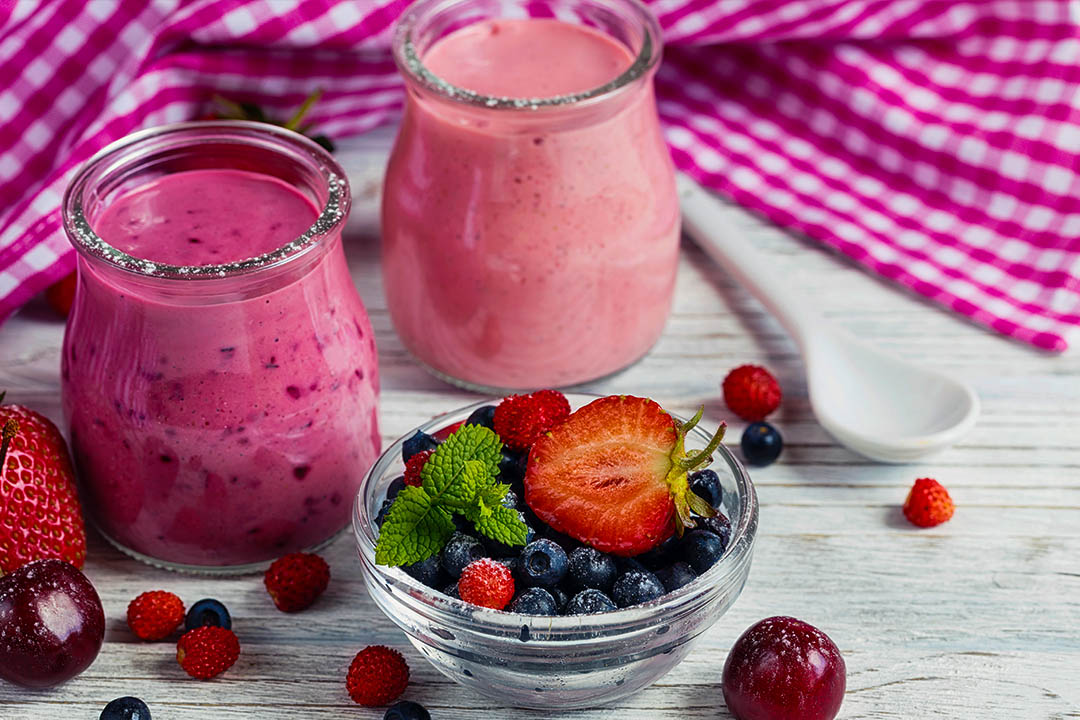11 Oct Increase Prebiotic Fibre and Fruit for Better Gut Health
by Ashleigh Feltham, Accredited Practising Dietitian and Accredited Nutritionist
Gut function is a key component to your overall health and wellbeing. Include adequate prebiotic fibre in your diet each day to maintain your health-promoting gut microbes. Prebiotic fibre is a type of fibre that your body cannot use as energy, but it is fuel for healthy bacteria in your gut. These healthy microbes then create chemical messengers in the form of short-chain fatty acids. Short-chain fatty acids are beneficial for almost every organ in your body.
An adult requires 25-38g grams of dietary fibre each day. This can be achieved by adding plant-based foods like nuts, seeds, whole grains, legumes, fruit and vegetables to your meals and snacks. In addition to this, supplement with food containing a type of fibre called inulin. This is a soluble, prebiotic fibre with known health benefits for your gut and microbiome.
Whole fruit contains not only fibre, but also polyphenols. Polyphenols are naturally occurring compounds found in plants with antioxidant and anti-inflammatory properties as well as other health benefits for the body. Research has added one more health benefit of polyphenols — as fuel to promote healthy gut microbes.
Specific polyphenols noted to increase health-promoting microbes are catechins, anthocyanins and proanthocyanidins. These three polyphenols increase the number of the health-promoting species of microbes called Lactobacillus, Bifidobacterium, Akkermansia, Roseburia and Faecalibacterium spp. When polyphenols are included in the diet, these species feed off them and create a health-promoting short-chain fatty acid called butyrate.
Some of the health promoting roles butyrate plays include reducing inflammation, promoting the healthy transport of nutrients in and out of your gut, maintaining a healthy gut wall lining, reducing oxidative stress, and reducing the risk of colorectal cancer.
Fruit high in catechins include blackberries, apples, black grapes, apricots, peaches, apples with the peel, cherries, pears and raspberries. Fruit high in anthocyanins include plums, bilberries, blueberries, strawberries, blackberries, red and black grapes, red cherries and black currants.
Fruit rich in proanthocyanidins include blueberries, cranberries, black and red grapes, grape seeds, strawberries and apples with peel.

Take home message:
Include fruit rich in polyphenols along with soluble, prebiotic fibre for a healthy gut. A healthy gut gives you the best chance of better overall health and well-being.
References:
- Prebiotic effect of dietary polyphenols: A systematic review. Journal of Functional Foods. Volume 74, November 2020, 104169. Aline MedeirosAlves-SantosClara Sandra AraújoSugizakiGlaucia CarieloLimaMaria Margareth VelosoNaves.
- Dictionary.com – polyphenol
- Nazzaro F, Fratianni F, De Feo V, Battistelli A, Da Cruz AG, Coppola R. Polyphenols, the new frontiers of prebiotics. Adv Food Nutr Res. 2020;94:35-89. doi: 10.1016/bs.afnr.2020.06.002. Epub 2020 Jul 7. PMID: 32892838.
- Foods High in Catechins. SFGate.
- Purple Power Foods! WebMd.
- Cardona F, Andrés-Lacueva C, Tulipani S, Tinahones FJ, Queipo-Ortuño MI. Benefits of polyphenols on gut microbiota and implications in human health. J Nutr Biochem. 2013 Aug;24(8):1415-22. doi: 10.1016/j.jnutbio.2013.05.001. PMID: 23849454.
- Sorrenti V, Ali S, Mancin L, Davinelli S, Paoli A, Scapagnini G. Cocoa Polyphenols and Gut Microbiota Interplay: Bioavailability, Prebiotic Effect, and Impact on Human Health. Nutrients. 2020 Jun 27;12(7):1908. doi: 10.3390/nu12071908. PMID: 32605083; PMCID: PMC7400387.
- Canani RB, Costanzo MD, Leone L, Pedata M, Meli R, Calignano A. Potential beneficial effects of butyrate in intestinal and extraintestinal diseases. World J Gastroenterol. 2011;17(12):1519-1528. doi:10.3748/wjg.v17.i12.1519




